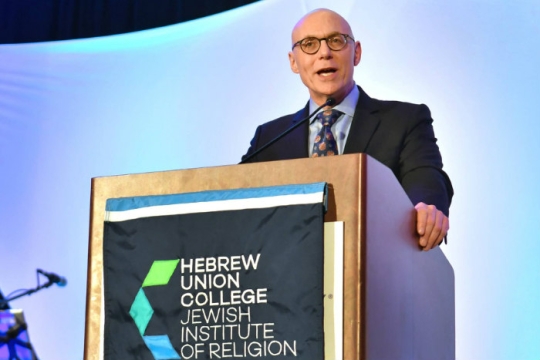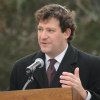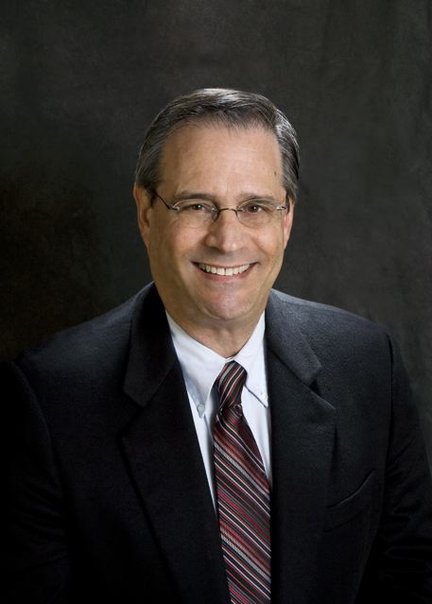
I’m writing too many eulogies for teachers of mine these days. But when I heard that Larry Raphael had died on Sunday, I wanted to put some thoughts into writing, for he was truly special.
Larry was a dean at Hebrew Union College-Jewish Institute of Religion (HUC-JIR) when I arrived at the New York campus in the early 90s. He published a few anthologies of Jewish mystery writing (his great passion), and it was fun to talk books with him. He taught professional development classes to rabbinical students, but those are not the lessons that I most cherish from him. There are two that I want to share here.
The first is that Larry was the constant champion of the school’s soup kitchen, which I ran for a few years, each week feeding about 200 people who came in off the city streets and into our school. Yet the soup kitchen was not universally embraced by the administration or the students at the time; it was big disruption to the operations of the building on Monday afternoons. But Larry worked tirelessly behind the scenes to make sure that it was funded and that it thrived. He regularly came to join in the cooking and serving. And he was personally supportive of me, helping me navigate the grant money, for instance.
The soup kitchen really was his baby for many years. It endures today, thanks in part to the strong foundation he laid when he was an administrator at the College-Institute.
The second thing for which I’m grateful to Larry is more intensely personal.
Did you ever have the feeling of not being sure if you belonged? The sensation that wherever you were, everyone except you seemed to know exactly where they were supposed to be going and what they were supposed to be doing? I can remember feeling that way at distinct moments when I was a kid in elementary school, sort of perpetually when I was in high school, and many other times since then. I used to think I was the only one who ever felt that way, but I’ve come to learn that I’m not alone.
Well, I sure felt like that the day I interviewed at HUC-JIR in New York: “What in the world am I doing here?” I was a senior at Colgate getting a degree in philosophy and religion, not the most pragmatic of majors. I made the decision to go to rabbinical school, but there was no Plan B. So I applied and showed up one winter morning at One West 4th Street for my interview.
I walked into the building and sat in the common area with another prospective student. She didn’t seem nervous at all; she seemed right at home. We made small talk. Then another prospective student came into the room. And the two of them—well, their eyes just lit up.
“J, is that you?”
“D, is that you? I haven’t seen you since…!”
And they fell into each other’s arms, two reunited old friends from Jewish summer camp who were now all set to become colleagues together.
As for me, I just sat there with a growing sense of imposter syndrome. I didn’t go to Reform summer camps, I didn’t like NFTY, and I sure wasn’t feeling like this impending interview was a big family reunion. Why would they accept me and not these two, who were obviously “naturals?” In my mind, I started figuring out my options in fast food or the gas-pumping industry.
And then Larry, the dean of students, came out and sat beside me. He made the perfect kind of small talk: he asked me about the musicians I liked (I exhaled “Coltrane!”) and the books I was reading (I had Borowitz’s Renewing the Covenant with me). He put me at ease. More important, he made me feel like I was qualified and deserved to be there at just the moment that my self-confidence was dissipating. Larry had a gentleness, inherent kindness, and good humor that were so precious to me that day and many times afterward. I’ll never forget it.
In recent years, those old bad feelings have occasionally returned with renewed fervor. And I’ve wished I had a Larry Raphael nearby for some self-esteem booster shots. Once in a while, an email would arrive from him out of the blue, usually after I’d published an essay or d’var Torah someplace and he’d want to let me know that he’d read it and liked it. Those notes meant a lot.
Look, I fear that in our world these days, celebrating a person’s kindness may seem banal. I want to be clear: there is nothing banal about being a kind person. It is irreplaceable. I’ve met brilliant academics, dazzling rabbis, and forceful advocates for social justice who were not personally kind people, who lack warmth or compassion or a sense that they care about you as an individual. And frankly, it mitigates their success in other realms. Their lack of personal kindness is a character flaw, and while we’re all imperfect creations, somehow their work is less admirable, less whole, because of this missing piece.
Not so with Larry. He consummately lived the Mishnah’s urgent prodding: “Receive every person with a cheerful countenance.” There’s a Torah of kindness that emanates from certain kind souls, and he was one of them. May his memory be a blessing.
Following his tenure at Hebrew Union College-Jewish Institute of Religion (HUC-JIR) and before he became the senior rabbi at Congregation Sherith Israel in San Francisco, CA, Rabbi Raphael was the director of the Department of Adult Jewish Growth at the Union for Reform Judaism. Read his thoughts on the blessing of lifelong Jewish learning in this post: "It’s Never Too Late To Begin: Rabbi Lawrence Raphael, z”l."
Have something to say about this post? Join the conversation in The Tent, the social network for congregational leaders of the Reform Movement. You can also tweet us or tell us how you feel on Facebook.
Related Posts
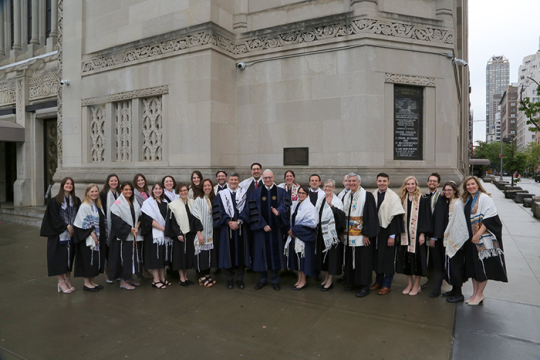
A Year of Strategic Change, Reckoning, and Gratitude
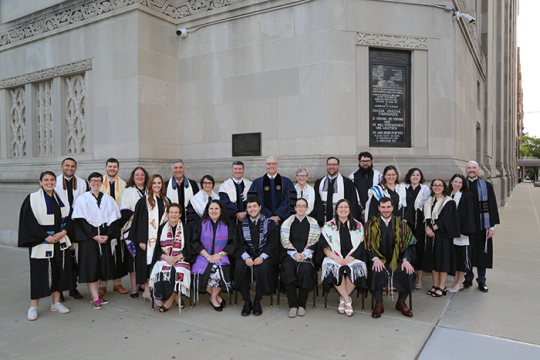
Ordination and Achieving the Highest Ethical Conduct
